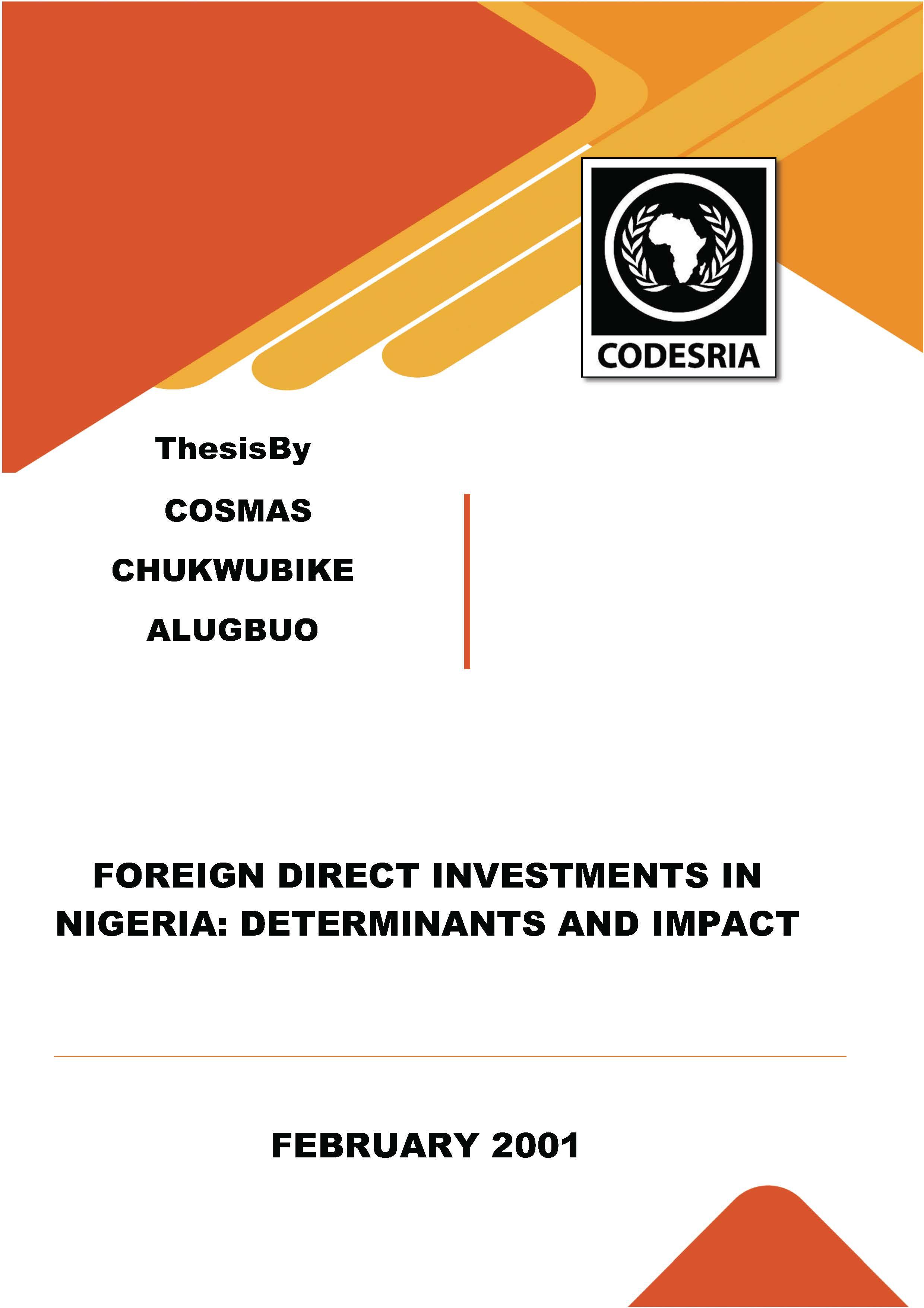Foreign direct investments in Nigeria: determinants and impact
Mots-clés :
Investissement direct, l'investissement étranger, transfert de technologie, change, croissance économique, des incitations, investissements directs étrangers, faible économie, NigeriaSynopsis
Cette étude examine les déterminants et l'impact des investissements directs étrangers (FOI) au Nigeria. ll est devenu nécessaire de mener une étude de cette nature car il existe deux obstacles majeurs à une croissance économique plus élevée auxquels le Nigeria est confronté au 21ème siècle. Ces deux obstacles sont la faiblesse des investissements et la pénurie de devises. La nécessité de cette étude était fondée sur le fait que les réformes macro-économiques initiées par le gouvernement ainsi que des incitations à l'investissement attrayantes n'ont pas produit des niveaux appréciables d'entrées d'investissements directs étrangers. L'étude a abordé les questions de recherche suivantes : Pourquoi l'afflux d'investissements directs étrangers n'a-t-il pas augmenté malgréamélioration de notre structure macroéconomique? Quels sont les facteurs que les investisseurs étrangers considèrent comme importants pour prendre leur décision d'investissement dans un pays comme le Nigéria ? L'économie est-elle « ouverte » et favorable aux investisseurs ? L'instabilité socio-politique affecte-t-elle négativement la liberté d'information ? Les investissements directs étrangers ont-ils contribué au transfert de technologie ? Quels sont les liens ou les relations entre les investissements étrangers directs et la faible économie ? En plus des objectifs ci-dessus, l'étude a prédit trois hypothèses touchant à l'instabilité socio-politique, aux incitations à l'investissement et à la croissance économique. Des techniques analytiques très larges ont été adoptées dans l'étude desdéterminants et impact des investissements directs étrangers. La première technique a consisté à enquêter auprès de 302 dirigeants de filiales étrangères. La deuxième approche impliquait l'application d'une analyse de régression sur des variables explicatives sélectionnées. Les conclusions peuvent être résumées comme suit : Comme le confirment les dirigeants des filiales étrangères et les résultats de la régression, l'instabilité sociopolitique est un obstacle majeur aux entrées d'investissements étrangers. En analysant la deuxième hypothèse et la question de recherche, il a été constaté que bien que les incitations aient été statistiquement significatives en tant que promoteur majeur des entrées de FOI, les investisseurs étrangers n'évaluent pas les investissements singulièrement élevés. L'étude a en outre confirmé que la liberté d'information au Nigeria a contribuéau transfert de technologie par la formation de la main-d'œuvre locale par des experts. ll a été confirmé par l'étude que FOI a des liens avec l'économie nigériane, en particulier sous la forme d'achat de matières premières locales par des entreprises étrangères. Dans l'ensemble, la FOI a contribué marginalement à la croissance économique au Nigeria.
Téléchargements
Références
Ackerman Susan-Rose, (1977) "Corruption and Development" Annual World Bank Conference on Development Economics B. Pleskovic and J.E. Stiglitz (ed) The World Bank Washington D. C.
Agarwal, J. P. (1980) "Determinants of Foreign Direct Investments: A survey" Weltwirtschafiliches 116-739-77.
Aharoni, Y. (1966) "The Foreign Investment Decision Process". Cambridge Mass. Harvard University Press.
.Ahwoi, K. (1996) "Attracting Foreign Capital: An African Experience" Security Market Journal Vol. 8.
Aliber, R. Z. (1970) "A theory of Direct Foreign Investment" in The International Corporation (ed C.P. Kindleberger), MIT. Press Cambridge, MA. pp. 17-34.
Anyanwu J. C. (1998) "Determinants of Foreign Direct Investment in Nigeria" in Rekindling Investment For Economic Development in Nigeria: Nigeria Economic Society, lbadan.
Ariyo A, (1998) "Investment And Nigeria's Economic Growth: Reflections and Policy Issues" in Rekindling Investment For Economic Development in Nigeria: Nigerian Economic Society, lbadan.
Ariyo A (1998) "Optimality of development financing mix: An evidence from Nigeria" Mimeo Development of Economics, University of lbadan.
Arerbech, A. J. K. A Hassett, and S. D. Oliner, (1954) "Reassessing the social returns to equipment investment." Quarterly Journal of Economics, vol. 109, No 3: 789-802..
Sanders, V.N. and J.T. White, (1968) "Us Direct Investment and Domestic Markets in Europe". Economics lnternazionale 21:11-33
Balassa, Bella, (1988) Public Finance and Economic Development. Pre working paper 31, Washington D. C. World Bank, Office of the Vice President for Economics, Processed.
Baker, H.K. and Haslem, J. A. (1973) "Information needs of Individual Investors" Selected Studies in Modern Accounting American Accounting Association, New York, New York
Baran, P.A. and Sweezy, P.M. (1996) Monopoly Capital: An Essay on the American Economic and Social Order, Penguin Harmondsworth.
Barnefee A. (1993) Cointegration Error - correction, and the econometric analysis of non-stationary data. Oxford, Oxford University Press.
Benneth, P. D.R. T. Green (1972). "Political Instability as a Determinant of Direct Foreign Investment in Marketing" Journal of Marketing Research, 9:162-186.
Blefer, M. I. and M. S. Khan (1984) "Government policy and private investment in developing countries". !MF Staff Papers, vol. 31, June 379-403.
Blomstorm, M. R. Lipsag and M. Zajan (1993) "Is Fixed investment the Key to economic growth" NBER Working paper 4436, Massachussets: National Bureau for Research, Cambridge, processed.
Benne!, P. (1990) "British Industrial Investment in Sub-Saharan Africa: Corporate Responses to Economic Crisis in the 1980's". Development Policy Review, Vol. 8.
Benhabib, J and B. Javanovie (1991) Externalities and growth accounting. American Economic, Vol. 81 No. 1: 82-113.
Bersterker, T. J. (1975) Distortion or Development: Contending Perspectives on the Multinationa Corporation, MIT Press, Cambridge MA.
Buckley, P. and Casson, M.C. (1976) "A long run Theory of the multinational enterprise". In The Future of the Multinationa Enterprise. (eds P.J. Buckley and M.C. Casson) Macmillian, London, pp. 32-65.
Buckley, P. and Casson, M. (1992) Multinational Enterprises in the World Economy Edward Elgar Pu lishing Co. Brookfield.
Buscaglia, E Jnr. (1995) "Judicial Reform in Latin America: The obstacles Ahead" Journal of Latin American Affairs Fall (Winter): 8-13. Business Champion, March 3, 1997 p. 7. Business Times, January 27, 1997 p. 13.
Cantwell, J. (1989) Technological Innovation and Multinational Corporations, Blackwell.
Cantwell, J. (1991) "A Survey of Theories of International Production" in The Nature of Transational Firm (eds N.P. Pitelis and R. Sugden). Routledge, London.






